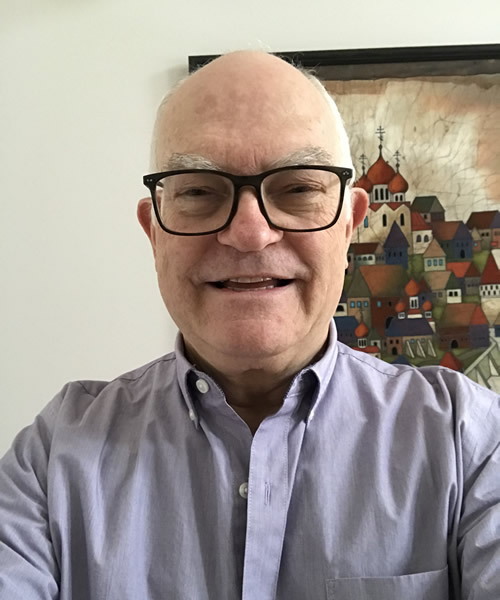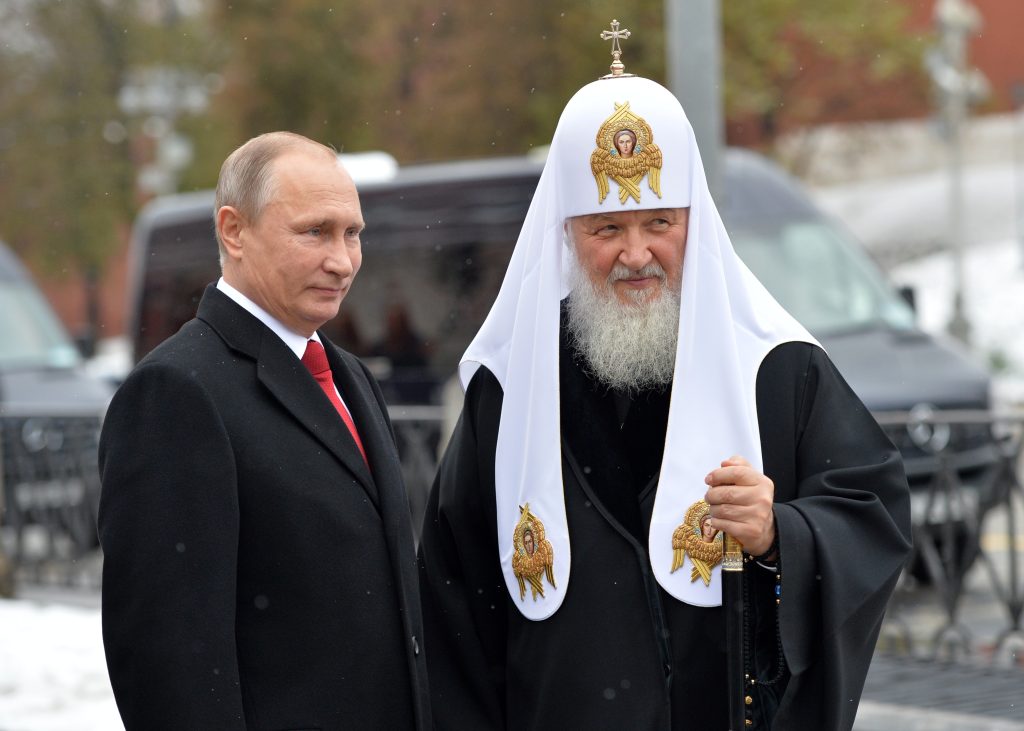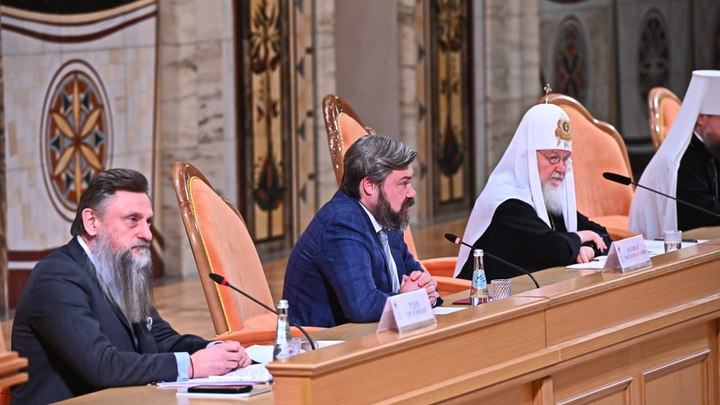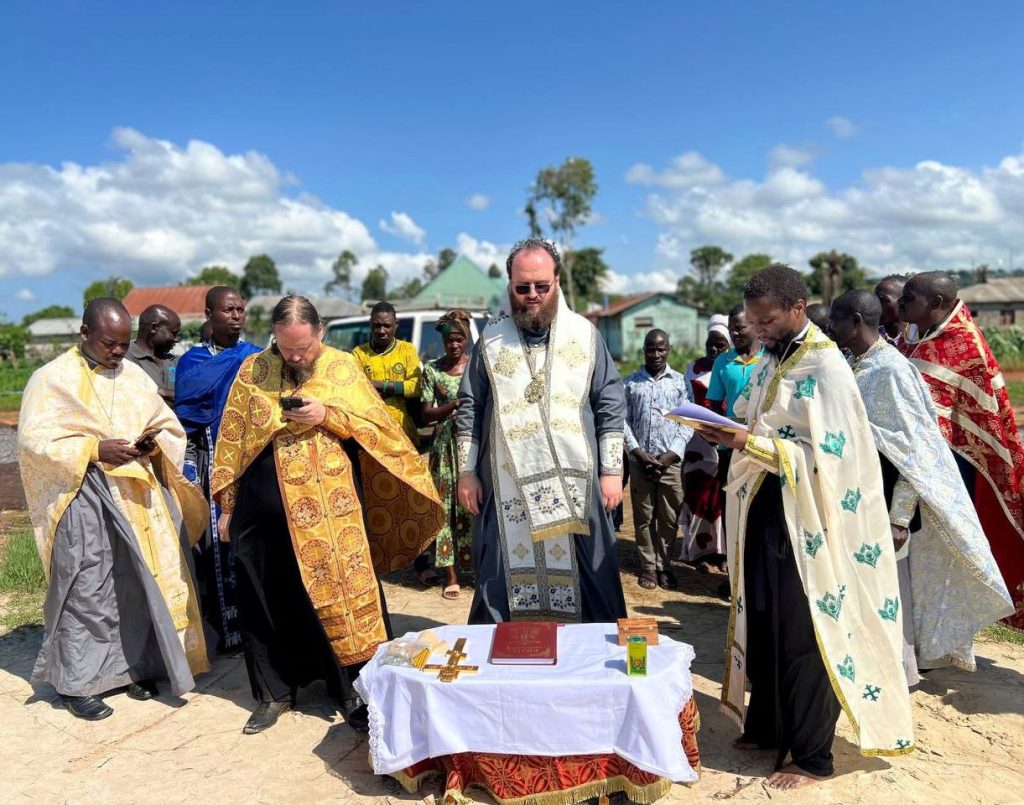
Jerry G. Pankhurst is professor emeritus of sociology and of Russian and Central Eurasian studies at Wittenberg University.
In global affairs, Patriarch Kirill and the Russian Orthodox Church operate in several arenas of action, and their actions are carried out on interrelated moral, normative, canonical, legal, political, and economic dimensions. We might imagine a globe with the headquarters of the Moscow Patriarchate at the center of a worldwide system of converging vectors of action on all these dimensions. (Imagine a huge spider sitting in Moscow with its many legs stretching around the world in all directions.) The vectors originate at the point of convergence, which is His Holiness Kirill, Patriarch of Moscow and All Rus’, surrounded by his most faithful assistants in ROC leadership. The vectors stretch out to points around the globe where the ROC has significant interests and attempts to exert influence on others.
One might imagine such a global vectored arrangement for many global organizations from businesses to international nongovernmental organizations (INGOs), but the multiplicity of arenas of action in which the ROC acts is noteworthy; indeed, the ROC must worry about a large number of arenas of action that grow from its particular nature and global position.
The ROC is more than a religious organization: it is intimately engaged in the Russian effort to justify and implement the current war in Ukraine, and that engagement includes not only religious and spiritual dimensions but also the complex political relationships it maintains with the Putin regime and obligations arising from those relationships.[1]
Institutions to Advance Its Global Pretensions
The ROC has a division that possesses great prestige and power to deal with issues related to international affairs: the Department of External Church Relations (DECR). While tending to Church business among Russian Orthodox faithful abroad, its chief personnel also very actively interact with the Russian Ministry of Foreign Affairs and related parts of the Russian government. DECR is closely connected with the core Patriarchal staffs and the Patriarch himself. In fact, before his enthronement as patriarch, Patriarch Kirill made his career as head of DECR, serving in that role from the end of the Soviet period through 2008.[2] And many of the activities of the current DECR seem to replicate the patterns Kirill institutionalized when he was in charge of this department.

The ROC’s role vis-à-vis Ukraine is only one instance, however deleterious, of its diverse worldwide engagement. The Russian Church’s global involvement reflects its “imaginary” as a powerful, rich, influential actor in the modern world. Patriarch Kirill understands the place of the ROC as the center of the “Russian World” or Russkiy mir, an arena that is not bounded by any state borders and embodies his spiritual vision of Russian culture and esthetics. Within this conceptualization, the Russian Church has great license to propagate its traditional values and entertain its own ideals for uniqueness. Kirill describes a special non-individualistic version of human rights, for example, that applies to members of the Russian World.[3] Russkiy mir is mystical and clearly imperialistic in its demands for the imposition of its alleged realities upon the broader world culture and society. It privileges the authoritarian designs of Vladimir Putin as an enlightened ruler even as it asserts freedom and creativity for the people. This vision justifies the unification of Ukraine and Belarus alongside Russia in a Russo-Slavic culture that needs cultivation and defense against alien forces. The idea is used by Putin to launch and sustain the attack on Ukraine, trying to “reclaim” it to fulfil the dream of Russkiy mir.[4]
Alongside ROC offices and theologians, the fundamentals of the Russkiy mir approach were worked out over Kirill’s long career after the end of the Soviet Union. One primary setting for the elaboration of those ideas has been the World Russian People’s Council (WRPC). The WRPC was founded by Kirill in 1993 when he was Metropolitan of Smolensk and Kaliningrad (1991–2009). The annual meetings of the WRPC, which continue to the present, provided Patriarch Alexi (d. 2008) and Kirill (as Metropolitan and then Patriarch) with a forum to discuss questions of the nature of Russianness and the place of Russia in the world with other Russian, Slavic, and Orthodox leaders. It was an ideal venue for formulating the deeper understandings that evolved into the Russkiy mir doctrine.[5]

In March this year, the WRPC released an extraordinary document setting out concrete plans for developing “The Present and Future of the Russian World.” Regarding domestic policy, this “mandate” advocates a series of traditional family values with associated demographic, urban and regional planning goals, but in foreign policy, it envisions the Russian World as a bulwark against western values and “Satanism”. And it sees the “special military operation” in Ukraine as a “Holy War”, that is, a “national liberation struggle of the Russian people against the criminal Kiev regime and the collective West behind it.”
The Russian Orthodox Church as an International NGO
As noted, Patriarch Kirill leads the Russian Orthodox Church as a large international nongovernmental organization or INGO. Scholars of INGOs acknowledge that INGOs have questionable effective restraints on their actions as they exist in the interstices of the state-based international order. International organizations like the United Nations and its agencies, agencies of the European Union, regional associations of governments, and the like are striving to develop norms and rules to limit or stop the bad behaviors and consequential damages of problematic INGOs.[6] The increasing international criticism of the Moscow Patriarchate for its complicity with the Russian war against Ukraine may bring it into legal and humanitarian jeopardy in the International Criminal Court or, with the Russian state, the Court of Justice or another similar agency or process. Nevertheless, it is quite difficult to interdict its actions as they are being carried out in real time.
Some theorists of foreign affairs have argued that a normative structure regulates much of international actions (cf., e.g., world polity theory). It may be rooted in the rules and practices of the United Nations or international organizations associated with various specific arenas of action. However, religious organizations have precious little normative control beyond voluntary frameworks for common projects to which they may or may not join. Although the ROC has sought to join many such organizations—the World Council of Churches is a major example—these organizations generally lack significant sanctioning power to control rule breakers. Moreover, the large size of the ROC and its significant international footprint have made sanctioning difficult and have intimidated such groups, as shown by the impotence of the World Council of Churches’ sanctions and official consultations of leaders in the midst of the Ukraine invasion. It seems clear that the ROC and its leaders do not respect international human rights norms when they might interfere with Russia’s expansionism.
The Expanding International Footprint
Although Ukraine represents the hottest international venue for ROC involvement, it is not the only one by far. The report of the 12 March 2024 meeting of the Holy Synod, the ROC’s highest ongoing administrative body, contains discussions of Church life and other matters by DECR delegates engaged with local operatives in Serbia, Syria, Lebanon, Ethiopia, Western Europe, Romania, Moldova, Egypt, Argentina, and Norway. It is clear from these notes that the ROC is cultivating important relationships with some groups of Orthodox Christians and forming significant alliances with various non-Orthodox churches in the interest of expanding its global footprint.
Of particular note in the Holy Synod agenda are the discussions of African affairs. Africa is a new field of action for the ROC, and one must ask why in just the last year it has become a focus of significant attention for DECR. The Russian Orthodox Church has created an African Exarchate with two eparchies, one for North Africa and one for the southern region. One function of this formal outreach into Africa is to connect in Christian mission with the Coptic, Ethiopian, and other churches that are “Oriental Orthodox” (or “Non-Chalcedonian”) churches. A specific agenda for cooperative activities with the Ethiopian Church was set out in 2018. (A similar program for cooperation was established in 2019 for relations with the Malankara Syriac Church in India.)

However, in the Eastern Christian orbit one church would not normally create its own jurisdictions overlaying a jurisdictional territory of another. The supervision of the Orthodox faith in Africa has historically been assigned to the Alexandrian Church. It is no secret that the ROC African Exarchate was created in the face of the Patriarch of Alexandria who has recognized the Orthodox Church of Ukraine. This is laid out explicitly on the website of the Exarchate with no qualifications.
Efforts to Promote the Russian Government Agenda Abroad
The incursion into Africa gives evidence of another noteworthy function of the Russian Orthodox Church’s activities abroad. The ROC, through the offices of the Patriarch and through DECR, works closely with the Russian Ministry of Foreign Affairs. According to the first Patriarchal Exarch of Africa, Metropolitan Leonid of Klin, the creation of the African Exarchate is an effort to carry out the national security strategy of Russia. Consistent with the Putin government’s official statement of national defense strategy, spiritual defense and the promotion of “traditional values” are goals of Russian foreign policy.[7] The U.S. State Department has recently noted a surge in interest in Africa by Russia that includes efforts at countervailing American projects related to health care by spreading disinformation. The Russian Church would seem to be an ideal vehicle for disseminating pro-Russian propaganda.
It is also clear that the Putin government is now reorienting its foreign policy in several ways to overcome the international isolation and sanctions imposed by Western governments, the European Union, and NATO. Russia is becoming more and more reliant on allies among the BRICS group of emerging nations, which recently added South Africa to its ranks, and it has begun a concerted effort to encourage “what it likes to call the ‛global majority’—from Algeria to Zimbabwe—to collaborate with the bloc.”[8] In the wake of the disorganization and reconstitution of Evgeny Prigozhin’s Wagner Group in Africa, bringing it under more direct Putinist control, and the general policy turn toward less-developed nations for support, the ROC’s move into Africa serves both as punishment, by un-canonical incursion into the territory of the Alexandrian Patriarchate, and as service to the Russian regime and President Putin in particular.
For Patriarch Kirill, leadership in synch with Vladimir Putin has become more than normal. They work closely together on common projects like the war in Ukraine and the elaboration of the “Russian World” concept and its implications.
References:
[1] The history of the ROC since 1991 also points to the likelihood of semi-autonomous economic involvements for church figures and legal and political involvements for prominent individuals in Europe and elsewhere, but we shall set these issues aside in this context.
[2] Jerry G. Pankhurst & Alar Kilp, Kirill and the 21st Century Russian Orthodox Church, in Liberals, Conservatives, and Mavericks: On Christian Churches of Eastern Europe Since 1980 (A Festschrift for Sabrina P. Ramet) (Frank Cibulka & Zachary T. Irwin eds., Central European Univ. Press 2024).
[3] Mitropolit Kirill, Svoboda i otvetstvennost’: v poiskakh garmonii (Moscow: Otdel vneshnikh tserkovskykh cviazei Moskovskogo Patriarkhata 2008).
[4] Interview by Herman Veenhof with Cyril Hovoroen, “Putin Is Patriarch Kirill’s Altar Boy. Without the Church There Would Have Been No War in Ukraine” (original in Dutch), Nederlands Dagblad (10 Feb. 2024).
[5] The website of the World Council is www.vrns.ru . For his leadership of the World Russian People’s Council, President Putin awarded Patriarch Kirill the “Presidential Prize for Contribution to Strengthening the Unity of the Russian Nation” in November 2023.
[6] Angela M. Crack, INGO Accountability Deficits: The Imperatives for Further Reform, 10(2) Globalizations 293, 293–308 (2013).
[7] It is enlightening that a quick look at the Russian presidential schedule on his website for 27–28 March 2024 lists telephone conversations by President Putin with three African presidents, the heads of Mali, Republic of Congo, and South Africa.
[8] Hanna Notte, Opinion, Putin’s Next Escalation Is Coming, N.Y. Times (29 Mar. 2024).
